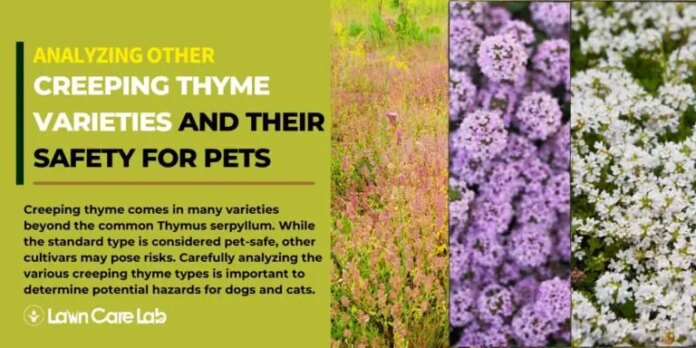If you’re a dog parent who loves gardening, you’ve probably wondered about red creeping thyme and dogs living together in harmony This aromatic ground cover is becoming increasingly popular in pet-friendly landscapes, but is it safe for your furry friends? Let’s dig deep into everything you need to know!
Understanding Red Creeping Thyme
Red creeping thyme (Thymus serpyllum) is a low-growing perennial herb that creates a beautiful carpet of fragrant foliage and tiny pink-purple flowers. As more pet parents explore options for their dog-friendly yards, this plant has caught lots of attention.
Safety First: Red Creeping Thyme and Dogs
Good news! Red creeping thyme and dogs can safely coexist in your garden. Unlike some toxic plants that can harm our four-legged friends, this herb is non-toxic and actually offers some neat benefits:
- Natural flea repellent
- Pleasant aromatherapy effects
- Durable ground cover that withstands puppy traffic
- Low maintenance requirements
Creating a Dog-Safe Garden with Red Creeping Thyme
Planning Your Layout
When incorporating red creeping thyme and dogs into your landscape design, consider these tips:
- Plant in high-traffic areas
- Use as border plants
- Create pathways
- Mix with other pet-safe plants
Maintenance Tips
To keep both your garden and pups happy
- Regular trimming
- Monitor for excessive consumption
- Ensure proper drainage
- Maintain healthy boundaries
Additional Benefits for Your Yard
As mentioned by experts at Pet like boss, creating a pet-friendly yard doesn’t mean sacrificing beauty. Here’s why this combo works:
-
Durability
- Withstands rough play
- Bounces back after compression
- Resistant to dog urine
-
Practical Benefits
- Natural pest control
- Reduces mud tracking
- Minimal maintenance needed
-
Aesthetic Value
- Year-round ground cover
- Beautiful flowering periods
- Pleasant fragrance
Common Questions and Concerns
Will My Dog Eat It?
While some dogs might nibble on the leaves, red creeping thyme isn’t typically appealing as a snack. However, even if they do, it’s safe in small amounts.
How to Introduce the Plant?
- Start small
- Monitor your dog’s reaction
- Gradually expand the planted area
- Maintain clear paths
Tips for Success
Planting Guidelines
- Choose sunny locations
- Ensure well-draining soil
- Space plants appropriately
- Water regularly until established
Training Your Dog
- Create designated play areas
- Use positive reinforcement
- Establish clear boundaries
- Reward good behavior
Alternative Pet-Safe Plants
If you’re looking for variety, consider these companions to red creeping thyme:
- Chamomile
- Rosemary
- Sage
- Mint (in contained areas)
Troubleshooting Common Issues
Plant Care Problems
- Yellowing leaves
- Sparse growth
- Poor flowering
- Pest issues
Dog-Related Challenges
- Digging habits
- Marking behavior
- Traffic patterns
- Plant damage
Seasonal Considerations
Spring
- Perfect for new plantings
- Monitor spring mud
- Watch for increased dog activity
Summer
- Regular watering needed
- Provide shade areas
- Watch for overheating
Fall
- Trim back growth
- Prepare for winter
- Monitor falling leaves
Winter
- Protect from frost
- Maintain clear paths
- Watch for ice buildup
Creating the Perfect Balance
Success with red creeping thyme and dogs comes down to proper planning and maintenance. Here’s your action plan:
-
Assessment
- Evaluate your space
- Consider your dog’s habits
- Plan traffic patterns
-
Implementation
- Choose quality plants
- Prepare soil properly
- Install gradually
-
Maintenance
- Regular monitoring
- Timely trimming
- Address issues promptly
Final Thoughts
Creating a yard that’s both beautiful and dog-friendly isn’t just possible – it’s totally achievable with plants like red creeping thyme! With proper planning and care, you can create an amazing outdoor space that both you and your furry friend will absolutely love.
Remember, every dog is different, so what works for one might not work for another. Pay attention to your pup’s behavior and adjust your garden design accordingly. With patience and dedication, you’ll soon have a gorgeous, pet-friendly yard that’s the talk of the neighborhood!
Need more tips about creating the perfect pet-friendly environment? Don’t forget to check out additional resources and expert advice to make your garden dreams come true while keeping your furry friends safe and happy!












